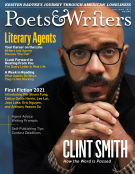The beginnings of M. Leona Godin’s new book, There Plant Eyes: A Personal and Cultural History of Blindness (Pantheon, June 2021), trace back to a class on Milton that she took as an undergraduate. Since then, Godin’s experiences as a scholar, writer, and performer have, as she says, “widened and elongated the scope” of her rich and probing book, which draws on the stories of Milton, but also of Louis Braille, Helen Keller, and the author’s blind friends, among others. “The book wrestles with ideas and biases that make being blind in an ocularcentric world more difficult than it ought to be,” says Godin. “I hope it can help to dismantle the inspiration-porn tendency to hold one blind person up above the rest and begin the exciting work of celebrating blind culture with an eye to creating blind pride.”

M. Leona Godin (Credit: Alabaster Rhumb)
The book deal for There Plant Eyes stemmed, in part, from Godin’s work with Catapult, which, as Godin puts it, “did exactly what its name suggests.” In 2018 she began writing the column A Blind Writer’s Notebook for the online platform, and after the first installment came out, editor Wah-Ming Chang—who met Godin at a Catapult workshop—connected Godin with her now agent, Markus Hoffmann. Godin’s columns, including those about her experience learning Braille and how blind people are often denied their sexuality, informed There Plant Eyes. The magazine regularly publishes narrative nonfiction, stories, and poems and in April, in collaboration with Catapult’s classes program, launched Don’t Write Alone, a vertical that focuses on the craft and business side of writing and publishing. Submissions are currently closed.
Godin started sending out her work to journals in 2014. “When I first began submitting my writing,” she says, “I had no idea what I was doing or what I was getting into.” After writing a stage production about the invention of Braille, she decided to send an adaptation of a monologue to Newtown Literary, a print biannual that publishes poetry, fiction, and nonfiction by writers with a connection to Queens, New York. “I think I sent it in using some ridiculous font, and I received a very bland rejection,” she recalls. “Months later, and I’d done my homework as to how to format submissions and craft nice cover letters. My next submission was accepted, and later I did some reviewing for Newtown Literary, as well as participating in several readings and events.” The nonprofit journal is dedicated to reflecting the people and languages of the New York City borough, which is one of the most diverse counties in the United States. Submissions are currently closed.
In 2015, Godin published another monologue she had written—this time she adapted it into a flash-fiction story that takes place in eighteenth-century Paris—with Danse Macabre. “I was delighted to be part of a lit mag that shared with me a kind of dark, Old World sensibility,” she says. Billed as “a magazine of the imaginative, the magical, the ethereal, the supernatural, the dark, the absurd, and the unknown,” Danse Macabre features poetry, fiction, nonfiction, and art in its monthly online journal and also runs a blog of “feuilleton, bon mots, gallimaufry, and coloratura macabrely.” The journal, which is edited in Las Vegas, accepts submissions year-round via e-mail.
Once Godin got into the rhythm of sending out work, she started perusing other writers’ bios to find places to submit, which is how she stumbled upon Quail Bell Magazine. Edited in New York City and Virginia, the arts and culture outlet regularly publishes essays, cultural criticism, poetry, fiction, interviews, and more, with an intersectional feminist ethos. Godin published another of her adapted monologues with the outlet and eventually wrote a column, Distill My Heart, on the science and aesthetics of spirits, aromas, and flavors. Godin says she honed her editorial chops from joining the “Quail Bell Crew,” a self-described team of “fairy punks who are citizens of the world,” and working with the magazine’s founding editor, Christine Sloan Stoddard. “I learned a lot about curating and calling for pitches and gently nudging a journal to be both what you envision it to be and open to the ideas and aesthetics of your volunteer editors.” Submissions are open year-round.
Godin’s experiences writing Distill My Heart and working with Stoddard motivated her to start Aromatica Poetica in 2017, a journal devoted to the “oft-neglected senses” of taste and smell. The online publication is “not specifically for, but welcoming to, blind readers and writers,” and grew out of Godin’s interest in smell, taste, olfaction, alchemy, and distillation, which developed as she lost the last of her vision. The online publication regularly showcases poetry, fiction, nonfiction, reviews, and interviews and takes inspiration from books such as Patrick Süskind’s Perfume and Chandler Burr’s The Emperor of Scent. Godin recently brought on a few assistant editors, who join her, columnist Catherine Haley Epstein, and art director Alabaster Rhumb. Submissions are open via e-mail until the end of June.
Dana Isokawa is the senior editor of Poets & Writers Magazine.








